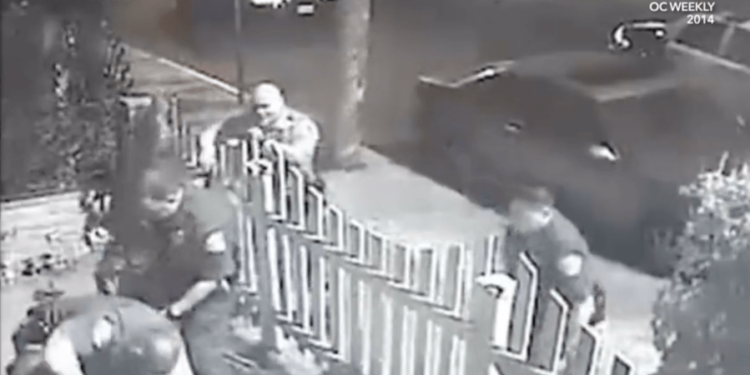The Santa Ana City Council on Tuesday voted to issue a formal apology to the family of Edgar Vargas who was wrongfully arrested, beaten and handed over to federal immigration officials 10 years ago in a case that sparked a fight for immigrant’s rights in the city.
A decade after her son’s arrest, Vargas’ mother, Olivia Arzate, still carries the anguish of those terrible events.
In surveillance footage of the June 2014 arrest that surfaced later, officers with the Santa Ana Police Department, who were responding to a burglary call, are seen using excessive force to arrest him.
“Officers appear to repeatedly hit [Vargas], then 27, and swing a baton at his legs as lies face down on the ground,” the Los Angeles Times reported.
Later, they would turn him over to agents with U.S. Immigration and Customs Enforcement.
“Edgar Vargas was essentially brutalized by Santa Ana police,” Carlos Perea, executive director of the Harbor Institute for Immigrant and Economic Justice, told KTLA’s Carlos Saucedo. “Then he was transferred over to ICE wrongfully and he was falsely accused of trying to harm a police officer.”
Years later, in 2019, a federal grand jury indicted a former SAPD officer, Brian Booker, for misconduct and lying about using self-defense as a cover for the brutal arrest.
“They beat him, arrested him for resisting arrest when he had given up,” Santa Ana City Councilman Benjamin Vasquez said.
Now, the city council is making a formal apology to the Vargas’ family.
“We want to make sure we understand that this kind of culture is not accepted in Santa Ana,” Vasquez added. “We want to highlight the things that happened in the past that led to police oversight, that led to a sanctuary city, that we are a city of immigrants and we’re going to protect everybody.”
Vargas’ mother told KTLA in Spanish that it is an honor to be granted this apology. Sadly, her son passed away two years ago.
Immigrant rights activists in Santa Ana credit Vargas’ case turning the city into a sanctuary and for preventing law enforcement from working directly with ICE.
“Edgar Vargas in many ways was the spark that started the fire,” Pera explained.











